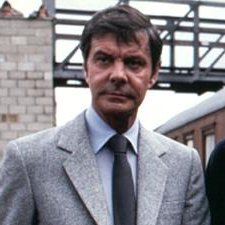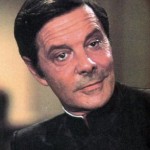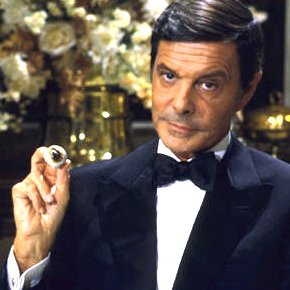 What makes a great Bond villain? In surveys of the most famous baddies in the 007 movies, Kamal Khan, the main villain in Octopussy (1983), tends to be naturally pushed aside by the likes of Goldfinger, Blofeld, Stromberg, and Le Chiffre. Yet, in his own way, Kamal Khan was just as devious and evil, and perhaps needs to be restored back to the Bond villain limelight again.
What makes a great Bond villain? In surveys of the most famous baddies in the 007 movies, Kamal Khan, the main villain in Octopussy (1983), tends to be naturally pushed aside by the likes of Goldfinger, Blofeld, Stromberg, and Le Chiffre. Yet, in his own way, Kamal Khan was just as devious and evil, and perhaps needs to be restored back to the Bond villain limelight again.
Prince Kamal Khan was played, of course, by the famous French stage, film and TV actor Louis Jourdan (1921-2015), who very sadly died on 14 February, 2015, in California, USA. In a sense, 007 fans were presented with a duo of main villains in Roger Moore’s sixth EON Bond movie Octopussy: Kamal Khan worked closely with the renegade Russian General Orlov, played so memorably by Steven Berkoff. Although the aristocratic Khan and the thuggish soldier Orlov were big contrasts, they both came across as slightly ‘mad’ in their own egocentric ways. But Khan, as played by Jourdan, tends to receive less coverage in books about the Bond movies, which is a pity.
The JBIFC takes a brief look back at Jourdan’s life and career, and his take on Bond villainy in the form of exiled Afghan Prince Kamal Khan. In many ways, Khan meets all the criteria of a good Bond villain, a baddie we all love to hate.
Jourdan’s Career
Born Louis Robert Gendre in France in 1921, Jourdan studied acting at the famous Ecole Dramatique and, while there, embarked on a professional acting career on the stage. At one point, his talented stage acting and apparent awareness of lighting angles came to the notice of director Marc Allegret, who approached Jourdan and invited him to work as an assistant camera operator on the movie The Curtain Rises (1938). The director then cast Jourdan in The Pirate (1939), in what would have been his first actual movie role. But the production was brought to a halt by the outbreak of war in 1939. During the war, in Nazi-occcupied France, Jourdan spent about a year on a work gang and, when he was ordered to help make German propaganda films, he refused to do so and fled south to the French Vichy zone. Pursuing his film career again for about two years, he also became involved with the French Resistance against both the collaborationist Vichy regime and the Nazis.
After the war, Jourdan resumed his acting career with enthusiasm in France, and his first American film was The Paradise Case (1947), which starred Gregory Peck. He never looked back. Notably handsome and suave, he made his Broadway stage debut in the early 1950s in The Immoralist (1954), which also starred a very young stage actor named James Dean. During the 1950s he appeared in several major Hollywood films, including The Swan (1956), with Grace Kelly and Alec Guinness, and The Bride is Much Too Beautiful (1956), with Brigitte Bardot.
His ‘breakthrough’ film was arguably the hit movie Gigi (1958), where he played the romantic lead role of Gaston Lachaille, alongside Leslie Caron and Maurice Chevalier. This film was a box office smash and won nine Academy Awards. Similar roles followed. However, Jourdan was also increasingly keen to break free of his typecasting as a French romantic lead, and he took a variety of roles in TV in order to subvert his Hollywood image as a stereotypical Frenchman. In the 1970s, for example, he won acclaim for his sinister and excellent Count Dracula (1977), for BBC TV. The famous shot of Jourdan as a part-human and part-bat Count, crawling slowly up the side of his castle at night, is said to have traumatized a whole generation of children!
Bond, James Bond
Jourdan was also a personal friend of Roger Moore, as well as Bond producer Albert ‘Cubby’ Broccoli. Jourdan’s casting as Kamal Khan in Octopussy is said to have been similar to the reason that Topol was cast in For Your Eyes Only (1981): the story is that Cubby Broccoli attended a party given by Jourdan in Beverly Hills, and decided afterwards to suggest the French actor for the role of Khan to director John Glen.

Kamal Khan, an exiled Afghan prince living in India, was presented in the movie as a rather mysterious figure who lived in a Monsoon Palace, was involved in gambling and smuggling, and had big interests in polo, cricket and tennis, as well as game-hunting. This ‘sporting’ side to Khan was possibly a concession to Jourdan’s own real-life sporting interests, especially his personal love of croquet, tennis and swimming. As John Glen recalled in his autobiography, For My Eyes Only in 2001, Jourdan had a suitably dark complexion for the role of the prince and ‘certainly carried the necessary authority to make an arresting villain’. On the other hand, according to Glen, there were times when Jourdan did not quite feel at home on the British Bond set, and the relaxed atmosphere and continual practical jokes (including by Moore) during the production of Octopussy threw the French actor slightly. Glen remembered having to regularly reassure Jourdan that everyone was always professional when it came to shooting a scene. Jourdan appeared to find the light-hearted banter and relaxed approach of the British production crews in between takes somewhat puzzling. He was also clearly uncomfortable when photographers were around, and tended to avoid unofficial snaps or giving autographs.
In September, 1982, when Octopussy made use of the Nene Valley Railway in Cambridgeshire, the current writer remembers vividly how Roger Moore played a number of practical jokes on set, including, at one point, walking down the platform wearing some ‘deely boppers’ on his head! Quite what the very serious Jourdan (who was also on set at the railway) made of all this is difficult to say. Nevertheless, as John Glen acknowledged, Louis Jourdan did a very good job of the role of Khan, including delivering possibly one of the funniest lines in the movie – as 007 is clinging precariously to the outside of his Beech 18 plane, Khan orders his incredulous henchman, Gobinda (played by the excellent Indian actor Kabir Bedi) to go outside and get Bond!
Although he was up against the equally demented General Orlov (played so powerfully by Steven Berkoff), there is no doubt that Jourdan’s Prince Kamal Khan was still able to deliver some of the best lines in the film, which he clearly delivered with relish, including ‘Mr. Bond is a rare breed. Soon to become extinct’. Another memorable scene involved Jourdan’s Kamal Khan treating 007 to a gourmet meal at the dining table – a stuffed sheep’s head; tucking in with enthusiasm, at one point Khan plucks out the sheep’s eyeball and pops it in his mouth. The reaction of Moore’s Bond is a sight to behold! But, according to Sir Roger, in real life his friend Louis Jourdan was actually something of a food expert, who ‘loved to be in charge of catering’. Roger also commented at one point: ‘We played tennis. And he loved to serve herring. Pickled herring’.
A Villain Royale
Jourdan gave Kamal Khan a suitably sinister aura of superior disdain, a man who was urbane, cultured and good-mannered in a snobbish kind of way, but was equally prepared to either torture or cold-bloodedly kill 007 without so much of a blink of the eye. It was an approach quite reminiscent of Michael Lonsdale’s Sir Hugo Drax, who also viewed Bond as a rather inferior and infantile nuisance who did not deserve to live. However, Khan did not entertain ambitions of global dominance – he was, rather, a sophisticated smuggler of gems, driven primarily by sheer greed. Although Khan lived lavishly in a palace in India, he was completely corrupt and untrustworthy, quite happy to double-cross Octopussy when the need arose. He was also a pathetic gambling cheat, something that ties in with the Fleming villain tradition, but is outwitted by Bond at backgammon, much to Khan’s fury (‘spend the money quickly, Mr. Bond’).
One of the reasons why Jourdan’s Kamal Khan tends to get pushed into the background compared to some of the EON franchise’s more memorable Bond baddies is that Jourdan himself was never very keen on talking about his roles, and rarely gave detailed interviews. One of the very few comments he made about his interpretation of Kamal Khan was made during the Thames Television special broadcast of the Royal Premiere of Octopussy at the Odeon, Leicester Square. Jourdan explained to the interviewer: ‘I think the key is to try and make villainy as attractive as possible since James Bond is perfection about what is good and what is right’. He said that he had tried to make his villain ‘perfect about what is bad, evil and wrong but always with humour’. He added: ‘Humour is the key to the Bond pictures’.
Perhaps another reason why we have only a few insights into how Jourdan conceptualized his Bond villain is that, in contrast to his friend Roger Moore, who was skilled at ‘marketing’ his roles and loved many of the aspects of being a ‘star’, Jourdan appeared to have an ambivalent attitude towards his own stardom, especially in his later career. At one point he commented: ‘I would rather be called a character actor than a star’. In fact, Jourdan was not all that interested in seeing himself on screen or on ‘unpacking’ his roles and explaining their psychological motivations or ambitions to journalists: ‘I never see my movies. When they’re on television, I click them away’.
Nevertheless, his small circle of close friends in the acting profession remained notably loyal to Jourdan and always found him charming and warm. Reacting to the passing of his friend in 2015, the late Sir Roger Moore said he was very sad to hear the news about Louis Jourdan, with whom he had ‘many happy memories of filming Octopussy together’.
Did You Know?
Along with Roger Moore, Louis Jourdan was one of the stars who attended the Royal Premiere of Octopussy at the Odeon, Leicester Square, in London in 1983, which was attended by his HRH Prince Charles. This gave the British press some great headlines to play with, including ‘A Prince meets a Prince’, and ‘Double-O-Princes’.

